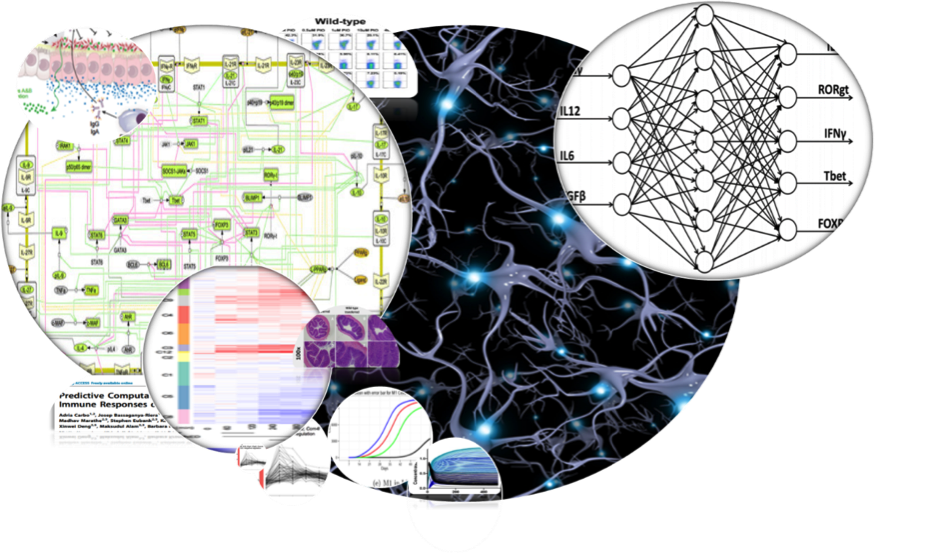Virginia Bioinformatics Institute researchers test “smart” simulations’ ability to interpret unknown variables in immune response

BLACKSBURG, Va., Oct. 15, 2015 – Technology with the ability to predict how our bodies will manage chronic diseases like Crohn’s disease promises to accelerate the discovery of new treatments, quickly identifying leads for further study and occasionally uncovering hidden and new knowledge about how our immune system operates.
Researchers at the Virginia Bioinformatics Institute’s Center for Modeling Immunity to Enteric Pathogens (MIEP) recently released a study in the open-access journal BioData Mining evaluating a set of these streamlined approaches for modeling our immune system—techniques employing a facet of artificial intelligence known as machine learning. Building on the analytical power of linear equation models, these systems get “smarter” as they’re provided with more information, picking out patterns in the data that can be used to make sense of unknown variables in the immune response.
The complexity of the immune system presents a serious challenge to researchers who want to mathematically model its behavior. CD4+ T cells, for example, can differentiate into at least 9 heterogeneous cell subsets, each of which plays its own unique role in orchestrating the body’s response to infection.
Traditional models would require each of those cellular behaviors to be painstakingly represented as elements of a linear equation in order for a simulation to return accurate results—a time-consuming process which leaves the system ill-equipped to factor new or unexpected variables into its calculations.
“For a long time, computational models were only as intelligent as we could program them to be, limiting their application to a defined set of biological functions,” said Vida Abedi, an Assistant Professor at the Nutritional Immunology and Molecular Medicine Laboratory (NIMML). “The ‘intuitive’ logic of machine learning means their scope isn’t set in advance—the same model could theoretically be scaled up from the cellular level all the way to the individual, human populations, and their environment.”
This test of machine learning methods was spearheaded by researchers in VBI’s Center for Modeling Immunity to Enteric Pathogens, a $12M National Institutes of Health/NIAID-funded resource dedicated to developing, validating and disseminating user-friendly models for studying the immune responses in the gut.
Comparing multiple approaches against the results of previous simulations and laboratory tests, the team found that one particular advanced machine learning method, Artificial Neural Networks, inspired from structure and information systems of interconnected neurons in the brain, could quickly be “trained” to predict the differentiation of CD4+ T cells. Building on recent successes in developing new models and tools has enabled modeling complex interactions in the gut’s mucosal immune system. The MIEP team hopes that further applications of machine learning could “personalize” their predictive power to meet the needs of specific individuals.
“No two people experience the same Crohn’s disease—genetics, environment, microbiome, nutrition, and medical history all play a role in how it is felt and how it should be safely managed,” said Josep Bassaganya-Riera, Director of NIMML and MIEP. “Advanced machine learning methods make it easier to consider all of those specific circumstances together, getting us a step closer to models that provide comprehensive and accurate predictions on each individual’s response to illness and can inform the development of precision medicine interventions and predict the success of human clinical trials.”
This project was supported in part by funding from National Institute of Allergy and Infectious Diseases contract no. HHSN272201000056C.
The Virginia Bioinformatics Institute was established in 2000 with an emphasis on informatics of complex interacting systems scaling the microbiome to the entire globe. It helps solve challenges posed to human health, security, and sustainability. Headquartered at the Blacksburg campus, the institute occupies 154,600 square feet in research facilities, including state-of-the-art core laboratory and high-performance computing facilities, as well as research offices in the Virginia Tech Research Center in Arlington, Virginia.
About NIMML
The NIMML Institute is a 501 (c) (3) non-profit public charity foundation focused on a transdisciplinary, team-science approach to precision medicine at the interface of immunology, inflammation, and metabolism. The NIMML Institute team has led numerous large-scale transdisciplinary projects and is dedicated to solving important societal problems by combining the expertise of immunologists, computational biologists, toxicologists, modelers, translational researchers, and molecular biologists. The Institute is headquartered in Blacksburg, VA. For more information, please visit www.nimml.org or contact pio@nimml.org.
